|
|
|
Sort Order |
|
|
|
Items / Page
|
|
|
|
|
|
|
| Srl | Item |
| 1 |
ID:
146009
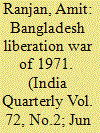

|
|
|
|
|
| Summary/Abstract |
Both the Bangladesh state and society are yet to settle the questions over and narratives related to the Liberation War of 1971. Broadly, there are two groups with contradictory and conflicting interpretations of the events related to that war. This has also led to the mushrooming of militant groups in the country. The beginning of trial of perpetrators of Liberation War crimes since 2010 and the execution of a few of the leaders has further polarised the society and politics of Bangladesh. The existing debates over the Bangladesh Liberation War cannot be studied without looking into the roles of India and Pakistan. The two countries have their own interpretations and political fallout of the 1971 liberation war.
|
|
|
|
|
|
|
|
|
|
|
|
|
|
|
|
| 2 |
ID:
179037
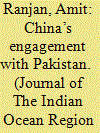

|
|
|
|
|
| Summary/Abstract |
Pakistan's closeness to China is mainly to balance a 'perpetual threat' from India that the Pakistani establishment has successfully instituted in the country over the years. To support Pakistan, China has been taking up a large number of projects in Pakistan that also strengthens its own political, economic and military position in South Asia. One such important project is a port at Gwadar in Pakistan's restive province of Balochistan. Although it is mainly projected as a commercial port, various reports in the international media claim that military facilities have been built at Jiwani, near Gwadar. This is, however, refuted by Pakistan and China. This paper discusses the trajectory of China-Pakistan relationships, looks at the nature of the Chinese engagements with Pakistan, examines the significance of Gwadar port for China and Pakistan, and analyses India's concerns and policy measures it has taken to address such concerns.
|
|
|
|
|
|
|
|
|
|
|
|
|
|
|
|
| 3 |
ID:
161448
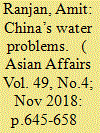

|
|
|
|
|
| Summary/Abstract |
This article looks at the problems facing China in regard of its water supply and usage. It considers China's available water resources and their uses, the growing water pollution, and the water management system adopted by China to secure the country's future. This includes small and large-scale projects, dams, the South-to-North Water Diversion Project/South-North Water Transfer Project (SNWDP/SNWTP) or Nanshuibeidiao, and the Sponge Cities Initiative. It also looks at some of the policy issues and relevant legislative frameworks developed to respond to the problem. This article argues that despite the measures taken by the Chinese government, water remains an area of concern for China.
|
|
|
|
|
|
|
|
|
|
|
|
|
|
|
|
| 4 |
ID:
190314
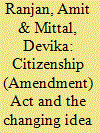

|
|
|
|
|
| Summary/Abstract |
In 2019, the Indian parliament adopted the Citizenship (Amendment) Act, which grants citizenship to non-Muslims ‘persecuted’ minorities such as Hindus, Sikhs, Buddhists, Jains, Parsis or Christians from Afghanistan, Bangladesh and Pakistan. Protests were held against the CAA in various parts of India. For protestors, the CAA is contrary to the secular character of the Indian citizenship. Supporters of the CAA also held rallies enumerating its benefits. This paper traces the historical evolution of the constitutional debates and changes in the Indian citizenship rules, and examines the socio-political impact of the CAA.
|
|
|
|
|
|
|
|
|
|
|
|
|
|
|
|
| 5 |
ID:
143319
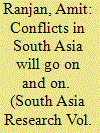

|
|
|
|
|
| Summary/Abstract |
This brief article, an extended review of two recent important publications, problematises the continuity of inter-state and intra-state conflicts since the partition of British India in 1947. Territory and identity are the main triggers of those conflicts, many of which will remain, while others will take on new forms relating to resource scarcity, mainly water. Conflicts are unlikely to be settled fully through various interventions, as sub-dimensions will linger on, develop new roots and new issues will constantly crop up. The article argues that past, present and future are visibly and invisibly connected through the fallout of patterns of myth and memory, dissatisfaction with the status quo and present conditions and often completely unrealistic expectations of a better future. Identifying elements of interconnectedness as central, the review assesses the contributions these two new studies make for a deeper understanding of the scenario of continuing conflict within the context of South Asian Studies.
|
|
|
|
|
|
|
|
|
|
|
|
|
|
|
|
| 6 |
ID:
135347
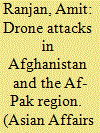

|
|
|
|
|
| Summary/Abstract |
This paper is an attempt to analyse the contentious role of drone strikes in the context of the options available in the on-going fight against terrorism in Afghanistan and the Af-Pak region. There are significant legal issues here, both in terms of human rights and in terms of state sovereignty and independence, though there are those who argue that the concept of a “just war” provides adequate justification. Pragmatists focus on effectiveness. In Afghanistan and Pakistan, there are many individuals who lend their support to the drone attacks because they see no other alternative(s), given that the prospects for dialogue seems so unpromising. But however many jihadist leaders are killed, in drone strikes, other effective counter-insurgency action may provide a better option.
|
|
|
|
|
|
|
|
|
|
|
|
|
|
|
|
| 7 |
ID:
190892
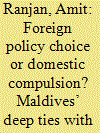

|
|
|
|
|
| Summary/Abstract |
This paper analyses how Maldives’ close ties with Saudi Arabia have affected its relations with other countries from Middle East Asia. Following the footsteps of Saudi Arabia, Maldives severed its diplomatic relations with Iran in 2016 and with Qatar in 2017. The paper discusses the economic investments Riyadh has made to develop civic infrastructure in the island nation. However, more than diplomatic ties and economic investments, close relations between Malé and Riyadh have affected the Island state’s society. There is a spread of religious obstructionism in Maldivian society, for which several outside scholars and Maldivians blame Saudi Arabia. Finally, the paper briefly discusses Maldives’ ties with Middle East countries other than Saudi Arabia.
|
|
|
|
|
|
|
|
|
|
|
|
|
|
|
|
| 8 |
ID:
157748
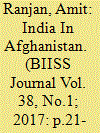

|
|
|
|
|
| Summary/Abstract |
Despite the Government of India’s repeated rejections of a demand for having Indian military boots in Afghanistan, there is an ongoing debate across the world, especially within India, over this issue. Whether India’s position secures its strategic interests or not, only future will tell. Historically, Afghanistan is known as a “graveyard of empires” where whosoever interfered has faced destruction — the last one was the erstwhile Soviet Union (1979-1989). At present, the United States (US) and Pakistan are bearing the brunt of their misadventures in 1980s. In this paper, after critically looking into the history and present situation in Afghanistan, the author examines the pitfalls of any form of military engagement by India in Afghanistan.
|
|
|
|
|
|
|
|
|
|
|
|
|
|
|
|
| 9 |
ID:
144207


|
|
|
|
|
| Summary/Abstract |
This article traces the development of the Sino-Indian Boundary problems from their origins during the “Great Game” period during the British Empire in India to the present day. The article looks at both the Western and Eastern Sectors, and traces the development of the various putative frontiers (the Johnson-Ardagh/ Macartney-MacDonald Lines and the McMahon Line respectively). The article looks at recent tensions which have arisen over the frontier areas, as well as the prolonged but unsuccessful attempts to solve the disputes, and considers what moves might be necessary to bring a final resolution of the problems.
|
|
|
|
|
|
|
|
|
|
|
|
|
|
|
|
| 10 |
ID:
125496
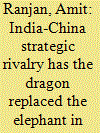

|
|
|
|
|
| Publication |
2013.
|
| Summary/Abstract |
Has China replaced or is an the process of "replacing" strategic presence of India in South Asia, is the most pertinent question, which keeps the Indian strategic community busy. It is known fact that since ancient time South Asia, as a region, had been under the influence of India; but things change since beginning of the Cold War.
|
|
|
|
|
|
|
|
|
|
|
|
|
|
|
|
| 11 |
ID:
140926
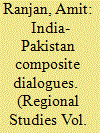

|
|
|
| 12 |
ID:
178069


|
|
|
|
|
| Summary/Abstract |
Political relationships and not the economic benefits of cooperation, guides India and Pakistan to take their respective stands on the hydroelectricity projects on the Indus River System. Therefore, almost all hydroelectricity projects on their shared river system have been strongly contested by one or the other riparian states. In recent years, the two countries have engaged in disputes on the Kishanganga Hydroelectricity Project on the Indian side of Jammu and Kashmir. Despite clearance by the Court of Arbitration in 2013, Pakistan raised other technical objections with the project. This article looks at India-Pakistan hydroelectricity issues, examines politics over the water and hydroelectricity projects, and analyzes difficulties in moving to a non-state centric approach.
|
|
|
|
|
|
|
|
|
|
|
|
|
|
|
|
| 13 |
ID:
186888
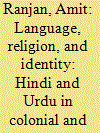

|
|
|
|
|
| Summary/Abstract |
This paper traces the history of a widening distance and constructed difference between Hindi and Urdu, and their communal identification in colonial and post-colonial India. It examines how majoritarian politics has shaped the language related issues in independent India. Finally, based on limited fieldwork in the Indian city of Mumbai, this paper tries to find out what language does common people speak.
|
|
|
|
|
|
|
|
|
|
|
|
|
|
|
|
| 14 |
ID:
179352
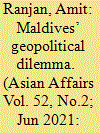

|
|
|
|
|
| Summary/Abstract |
This article discusses the complicated and developing rivalry between India, China, and the US in the Maldives. It gives a detailed account of the relationships between each of these powers and the Maldives as a small state over recent years, particularly in the economic and military spheres, and in particular looks at the domestic impact of the country's relationship with these large external powers as it attempts to steer the most advantageous course between them.
|
|
|
|
|
|
|
|
|
|
|
|
|
|
|
|
| 15 |
ID:
190896


|
|
|
|
|
| Summary/Abstract |
The Middle East and South Asia can be defined as interlinked political spaces that experience deepening interactions of their energetic and ambitious regional powers together with the constant strategic competition of major global powers. This vibrancy has been relentlessly fuelled by the geo-economic/political/strategic, and humanitarian needs of these two regions’ actors. Since there are no regional groupings effectively representing the two regions these interactions are mostly minilateral or bilateral and are bolstered by historical, cultural and religious affinities. Yet, due to the relatively higher power status of the Middle East, these transregional interactions operate on an asymmetrical basis.
|
|
|
|
|
|
|
|
|
|
|
|
|
|
|
|
| 16 |
ID:
178054
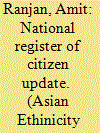

|
|
|
|
|
| Summary/Abstract |
The release of the final draft of the National Register of Citizen for the Indian state of Assam has created anxiety among more than four million people whose names are missing. It is not clear what will happen to those whose names may not appear in the final list, which is in the process. Historically, the population movement in the region started centuries back when India was under the British rule. In 1947, the British India was partitioned between India and Pakistan, and in 1971 the West and East Pakistan separated, and Bangladesh was born. Despite such changes in the territorial and political sovereignty, immigration and population movement in the India’s northeast from across the International border continues for many reasons, though the Bangladesh government does not accept it.
|
|
|
|
|
|
|
|
|
|
|
|
|
|
|
|
| 17 |
ID:
156528
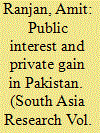

|
|
|
|
|
| Summary/Abstract |
Despite labels like ‘failed state’ or ‘hub of terror’, Pakistan remains a somehow ‘normal’ postcolonial country. While many problems are shared by such nations, Pakistan’s complex journey into the future needs to be better understood. Among specific problems, militancy and terrorism have been mainly presented as resulting from interventions by external actors, blaming others. However, failures in internal management and (mis)-adventurous foreign policies have also led to turmoil, disrupting domestic economic development and slowing the pace of democratisation.
Assessing the scope for future developments in Pakistan, this article argues that presently Pakistan’s power elites are still not fully ready to admit having learnt from the country’s past mistakes, repeating the same to secure proclaimed public interests, at the cost of killing many of their own citizens. Yet, while the overall picture remains one of precarity, there is also considerable progress. The final analysis explores how this precarious re-balancing has been achieved and is being maintained, and what this means for the future of Pakistan and South Asia.
|
|
|
|
|
|
|
|
|
|
|
|
|
|
|
|
| 18 |
ID:
140367


|
|
|
| 19 |
ID:
183858
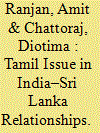

|
|
|
|
|
| Summary/Abstract |
More than 25 years of ethnic war in Sri Lanka ended in 2009. Expressing ‘serious concerns’ on human rights situation in post-civil war Sri Lanka, the United Nations Human Rights Council (UNHRC) has adopted critical resolutions. The eighth such resolution was adopted in March 2021. India abstained for the second time from voting on a resolution against Sri Lanka at the UNHRC since 2014. In 2012 and 2013, India voted in favour of resolutions that have been critical of Sri Lanka. This article, examines the shift in India’s approach towards the Tamil issue in Sri Lanka.
|
|
|
|
|
|
|
|
|
|
|
|
|
|
|
|
| 20 |
ID:
140305
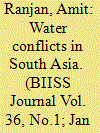

|
|
|
|
|
| Summary/Abstract |
Water conflict in South Asia is one of the critical challenges for the region. The unitary irrigation system constructed since Mughal period was divided in 1947, when the sub-continent was partitioned into India and Pakistan. Not enthusiastic to break the then existing hydrological, railway and port systems, Sir Cyril Radcliffe took ‘other factors’ also into consideration and not only religion as a sole determinant to partition the sub-continent. Despite his efforts, the water bodies were divided between the two arch enemies. Soon after the partition, the conflicts over shared water bodies started and have been graduated over the decades. The political animosities among the South Asian neighbours have inflamed the water conflicts further. As a result, arrangements, agreements and treaties seeking cooperation over shared water resources have failed to address water related grievances of each country. One common allegation the neighbouring countries have is that India exploits their resources for its own use. This allegation helps the radical elements from those countries to espouse the causes and raise the cries of water nationalism. Not only in those countries, the feeling of ‘sovereign’ rivers is also strong in India. The political tensions over water are duly aided by the growing supply-demand gap, phenomenon of climate change and predominant use of supply-side management system. Though the water conflicts are bilateral, it has regional implications. Realising this fact, in most of the regions, the regional organisations have taken steps to mitigate differences among the riparian states and have helped them to enter into a cooperative arrangement. In South Asia, this is difficult to attain because the South Asia Association for Regional Cooperation (SAARC) is not a very effective body.
|
|
|
|
|
|
|
|
|
|
|
|
|
|
|
|
|
|
|
|
|